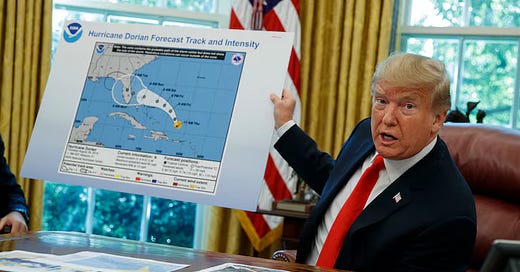Trump Just Buried America’s Most Trusted Climate Disaster Database
NOAA didn’t just decide to stop tracking billion-dollar climate disasters—Trump did. And the consequences are deadly.
In a move that should alarm anyone concerned about truth, science, or public safety, the Trump administration has halted updates to America’s most important climate damage tracker: the Billion-Dollar Weather and Climate Disasters database maintained by the National Oceanic and Atmospheric Administration (NOAA)
Since 1980, this resource has catalogued every U.S. extreme weather disaster causing over $1 billion in damage. Over 45 years, it documented 403 disasters totaling more than $3 trillion in inflation-adjusted costs. It’s been the backbone of local resilience planning, federal disaster aid applications, insurance research, and public understanding of just how expensive climate change has become.
Now, the Trump administration has pulled the plug.
Citing “evolving priorities, statutory mandates, and staffing changes,” NOAA quietly announced it would no longer maintain the database - an agency decision in name only. This is more than a bureaucratic reshuffling. It's a politically motivated decision that aligns with the Trump administration’s broader agenda to dismantle federal climate infrastructure and protect polluters.
NOAA claims the database will remain archived through 2024, but no other institution can match the scale, rigor, and credibility of this dataset. That’s because the agency had unique access to proprietary insurance data, which are figures that private firms won't share with one another, but would disclose to a trusted, nonpartisan science agency.
The fallout will be far-reaching. The database translated abstract climate science into cold, hard dollars; dollars that amounted to billions in damages from storms, wildfires, floods, droughts, and heatwaves, many intensified by fossil fuel-driven warming. It also illuminated a widening gap between who causes the damage and who pays for it.
In 2024, Hurricanes Helene and Milton caused $113 billion in damage and claimed more than 250 lives. A separate, country-wide drought cost $5 billion and resulted in over 100 heat-related deaths. While fossil fuel companies posted record profits, the economic burden fell on taxpayers, local governments, and frontline communities.
Without this resource, communities lose a vital tool for proving harm and demanding accountability. Cities like Asheville, NC have used NOAA’s data to justify critical infrastructure investments, like rebuilding a dam that helped protect lives during Helene’s floods. Without that evidence, how do we justify similar resilience efforts? How do we make polluters pay?
We’re facing an accelerating crisis. In just the past five years, billion-dollar disasters have averaged 23 per year — up from just three in the 1980s. And forecasts for 2025 suggest an unusually active hurricane season, with up to 19 named storms and at least five major hurricanes.
Despite mounting extreme weather threats, the Trump administration is forging ahead with drastic cuts to NOAA’s budget, slashing $1.5 billion primarily from climate-related programs. Critical National Park grants are being eliminated, top scientists behind the nation’s leading climate assessments are being forced out, and now the country’s most trusted system for tracking disaster costs is being dismantled.
If we can’t measure the problem, we can’t fix it. And that’s the point.
Protecting our communities starts with understanding the risks they face. That means investing in climate data infrastructure, pushing federal agencies and lawmakers to restore this essential resource, and ensuring that the industries driving climate change help pay for the damage they cause.
If your house is on fire, you don’t rip out the smoke detectors. The climate crisis is already here, and the costs are mounting whether we track them or not. Ending data collection doesn’t just hide the problem — it guarantees we’ll be less prepared for what comes next.
Tell your state leaders: If Trump won’t track climate damages, then we need to – and we need Big Oil to help pay for them. Support a Climate Superfund in your state: MakePollutersPay.net




